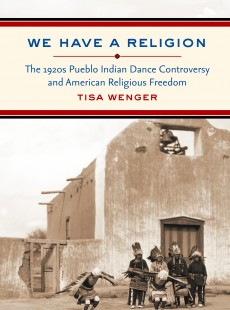
We Have a Religion
The 1920s Pueblo Indian Dance Controversy and American Religious Freedom
Tisa Wenger
 Publisher: University of North Carolina Press
Publisher: University of North Carolina Press
Imprint: The University of North Carolina Press
Published: 05/2009
Pages: 360
Subject: Religion, Social Science
| University of North Carolina
Print ISBN: 9.78E+12
eBook ISBN: 9780807894217
DESCRIPTION
In the 1920s, Pueblo Indian leaders in New Mexico and a sympathetic coalition of non-Indian reformers successfully challenged government and missionary attempts to suppress Indian dances by convincing a skeptical public that these ceremonies counted as religion. This struggle for religious freedom forced the Pueblos to employ Euro-American notions of religion, a conceptual shift with complex consequences within Pueblo life. Long after the dance controversy, Wenger demonstrates, dominant concepts of religion and religious freedom have continued to marginalize indigenous traditions within the United States.




